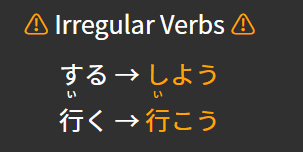Let’s
I shall・I will
casual volitional
Structure
食べる→食べ よう ・ 買う→買 おう
する→しよう・くる→こよう
[Used to show volition; willingness to do something]

Let’s
I shall・I will
casual volitional
Structure
食べる→食べ よう ・ 買う→買 おう
する→しよう・くる→こよう
[Used to show volition; willingness to do something]
What about the other form of verb?
and can someone please explain why the last sentence is とう instead of よう
There are 3 kinds of verb in Japanese that are split into 3 groups. I wrote a detailed explanation about them here.
待つ is a group 1 verb. Since it ends in つ, the volitional form conjugates as とう. If it ended in ぐ, it would be ごう, it it was ぶ, it would be ぼう, etc. Please see this video for an explanation of how to conjugate verbs into a casual volitional form.

Shouldnt the lower one be くる → こよう instead? 
@xBl4ck Nice spot! Thank you for drawing this to our attention so that we could get it fixed. Cheers!
What does る5 mean?
Okay thanks - I’d figured it was a godan verb, just haven’t seen a number above る2 before!
Hi, I was just wondering will stuff like this be on the JLPT Exam?
推量 - Expresses guesses (has a similar meaning to だろう, which itself is the よう form of だ)
意志 - Expresses intentions (has a similar meaning to ~するつもりだ)
勧誘 - Expresses invitations or encouragement (has a similar meaning to 誘う ‘to invite’)
LIke we gotta know the kanji names of each use of う・よう?
As far as I’ve seen, JLPT is a practice-oriented test, not a theory-oriented test. You are not expected to answer what category/part of speech/etc a word or usage falls under. You just have to understand what words mean and how they are used.
So it’s helpful to understand that the same ~よう form can mean different things, but you don’t have to know these category names.
That said, the words 意志 and 勧誘 themselves are common enough to come up on JLPT.
Thank you!